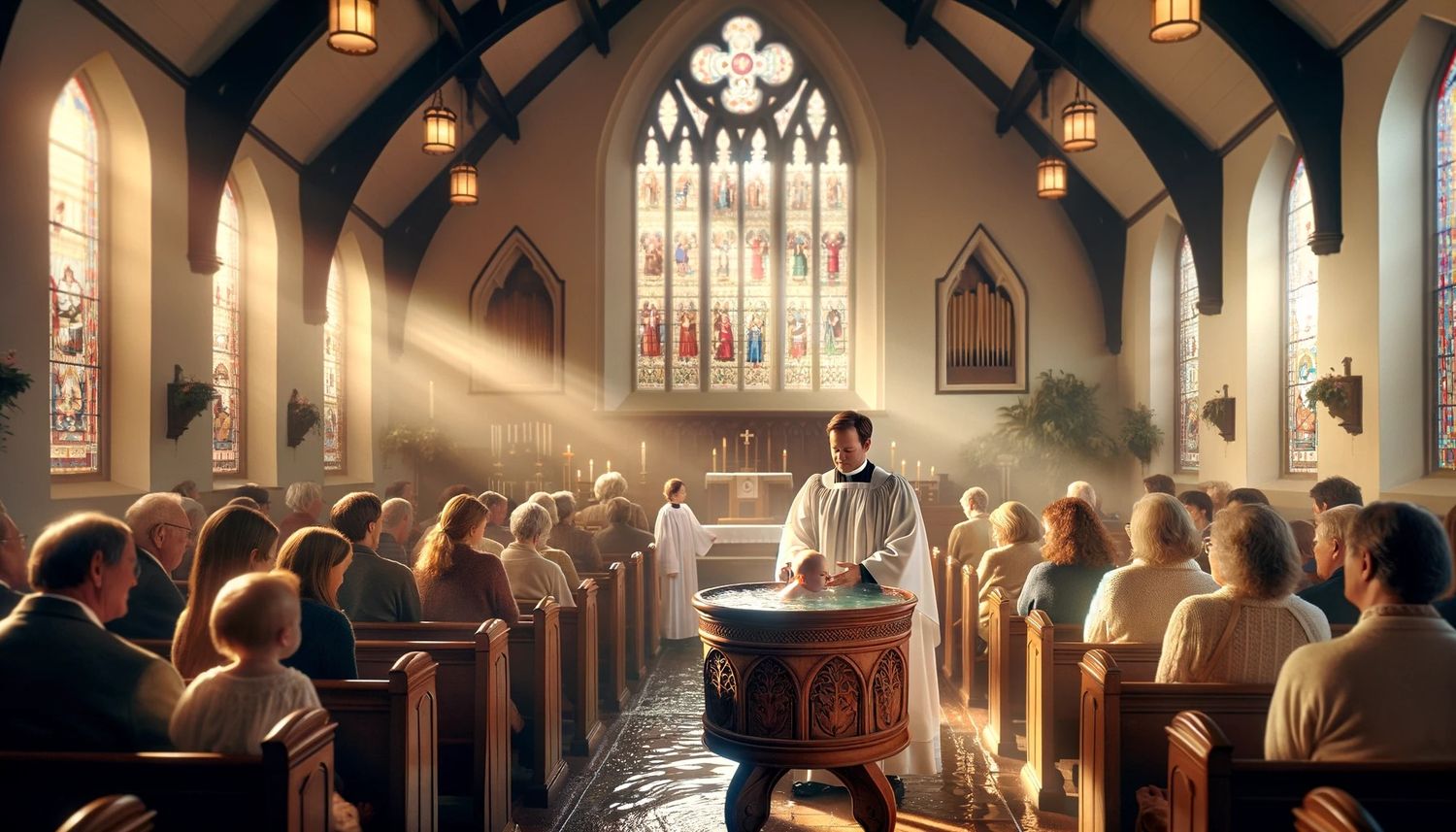Home>Theology and Spirituality>What Do Southern Baptist Believe About Homosexuality


Theology and Spirituality
What Do Southern Baptist Believe About Homosexuality
Published: February 24, 2024
Peter Smith, Editorial Director at Christian.net, combines deep insights into faith, politics, and culture to lead content creation that resonates widely. Awarded for his contributions to religious discourse, he previously headed a major organization for religious communicators, enhancing dialogue on faith's societal impacts.
Discover the Southern Baptist perspective on homosexuality and explore their beliefs in theology and spirituality. Learn about their stance and teachings on this important topic.
(Many of the links in this article redirect to a specific reviewed product. Your purchase of these products through affiliate links helps to generate commission for Christian.net, at no extra cost. Learn more)
Table of Contents
- Introduction
- Historical Perspective on Southern Baptist Beliefs
- Official Southern Baptist Statements on Homosexuality
- Southern Baptist Views on Same-Sex Marriage
- Southern Baptist Views on LGBTQ+ Rights
- Southern Baptist Views on Conversion Therapy
- Southern Baptist Views on LGBTQ+ Inclusion in the Church
- Conclusion
Introduction
The Southern Baptist Convention (SBC) is one of the largest Protestant denominations in the United States, known for its conservative theological stance and adherence to traditional Christian values. As a prominent force in American evangelicalism, the SBC plays a significant role in shaping religious discourse and social attitudes within the country.
The SBC's beliefs and teachings on various social and moral issues, including homosexuality, have been the subject of widespread interest and debate. Understanding the Southern Baptist perspective on homosexuality requires an exploration of the denomination's historical context, official statements, and prevailing views within its congregations.
In this article, we will delve into the complex landscape of Southern Baptist beliefs regarding homosexuality, examining the denomination's historical perspective, official statements, and current positions on key issues such as same-sex marriage, LGBTQ+ rights, conversion therapy, and LGBTQ+ inclusion in the church. By gaining insight into the multifaceted dimensions of Southern Baptist beliefs on homosexuality, we can develop a comprehensive understanding of the denomination's stance and its implications within the broader societal and religious contexts.
Historical Perspective on Southern Baptist Beliefs
The historical perspective on Southern Baptist beliefs regarding homosexuality is deeply rooted in the denomination's traditional interpretation of biblical teachings. Since its formation in the early 19th century, the Southern Baptist Convention has upheld a conservative theological framework that emphasizes the authority of the Bible and the sanctity of traditional Christian doctrines. This theological orientation has significantly influenced the denomination's historical stance on social and moral issues, including attitudes towards homosexuality.
Throughout much of its history, the Southern Baptist Convention has maintained a doctrinal position that views homosexuality as incompatible with biblical teachings. This perspective is informed by a literal interpretation of certain biblical passages, particularly those found in the Old Testament and the writings of the Apostle Paul in the New Testament. These scriptures have been traditionally understood within the SBC as condemning same-sex relationships and portraying homosexual behavior as sinful.
The historical perspective on Southern Baptist beliefs regarding homosexuality has also been shaped by broader cultural and societal factors. As the denomination evolved within the American South, it became intertwined with regional attitudes and values, including traditional views on gender, sexuality, and family structures. This cultural context further reinforced the SBC's historical position on homosexuality, aligning it with conservative social norms prevalent in the Southern United States.
Moreover, the historical trajectory of the Southern Baptist Convention has been marked by periods of internal debate and theological contention over various social and ethical issues, including homosexuality. While the denomination has consistently upheld a traditional stance on this matter, there have been ongoing discussions and divergent viewpoints within Southern Baptist circles, reflecting the complexities of interpreting biblical teachings in relation to contemporary societal changes.
In summary, the historical perspective on Southern Baptist beliefs regarding homosexuality underscores the denomination's adherence to a conservative theological framework, its alignment with traditional interpretations of biblical passages, and its embeddedness within regional cultural contexts. This historical backdrop provides crucial insights into the development of the SBC's position on homosexuality and its enduring influence on the denomination's theological and ethical outlook.
Official Southern Baptist Statements on Homosexuality
The Southern Baptist Convention (SBC) has articulated its official stance on homosexuality through various statements and resolutions, providing a clear doctrinal position that reflects the denomination's theological convictions. These official pronouncements serve as foundational documents that guide the beliefs and practices of Southern Baptist congregations and leaders.
Central to the SBC's official statements on homosexuality is the affirmation of the Bible as the ultimate authority in matters of faith and practice. The denomination's doctrinal position emphasizes the biblical teachings on human sexuality, marriage, and moral conduct, interpreting them within a traditional theological framework. This foundational commitment to scriptural authority underpins the SBC's approach to addressing issues related to homosexuality.
The SBC's official statements consistently uphold the view that homosexual behavior is contrary to God's design for human relationships as outlined in the Bible. These pronouncements affirm the traditional understanding of marriage as a covenant between one man and one woman, reflecting the denomination's commitment to a heterosexual model of marital union. Furthermore, the SBC's official stance on homosexuality underscores the belief that same-sex attraction, when acted upon, is incompatible with the biblical standards of sexual morality.
In addition to articulating its doctrinal position, the Southern Baptist Convention has expressed pastoral concern and compassion for individuals experiencing same-sex attraction. While affirming the biblical teaching on the sinfulness of homosexual behavior, the SBC's official statements emphasize the importance of extending love, support, and pastoral care to those grappling with same-sex attraction. This pastoral dimension reflects the denomination's commitment to ministering to individuals with grace and understanding, even as it upholds its traditional theological convictions.
Overall, the official Southern Baptist statements on homosexuality serve as foundational declarations that articulate the denomination's doctrinal position, affirming the authority of the Bible, upholding traditional views on marriage and sexual morality, and emphasizing pastoral care for individuals navigating issues related to same-sex attraction. These statements play a pivotal role in shaping the theological framework and ethical outlook of the Southern Baptist Convention, providing a comprehensive guide for its congregations and leaders as they engage with the complexities of contemporary societal issues.
Southern Baptist Views on Same-Sex Marriage
The Southern Baptist Convention (SBC) holds a steadfast and unequivocal position on same-sex marriage, rooted in its traditional interpretation of biblical teachings and theological convictions. Central to the SBC's stance is the affirmation of marriage as a sacred covenant ordained by God, designed to be a lifelong union between one man and one woman. This foundational belief aligns with the denomination's commitment to upholding traditional Christian doctrines and biblical principles regarding human relationships and sexuality.
From the SBC's perspective, the institution of marriage is intricately woven into the fabric of God's redemptive plan for humanity, reflecting the divine union between Christ and the Church. This theological understanding underpins the denomination's resolute opposition to the redefinition of marriage to include same-sex unions. The SBC firmly maintains that any departure from the biblical definition of marriage undermines the sanctity and divine purpose of this sacred institution.
Furthermore, the Southern Baptist Convention has been actively engaged in advocating for the preservation of the traditional understanding of marriage within the broader societal and legal contexts. The denomination has consistently voiced its opposition to legislative and cultural initiatives aimed at legalizing same-sex marriage, emphasizing the importance of upholding the biblical model of marital union as the cornerstone of a healthy and flourishing society.
In addition to its theological and societal concerns, the SBC's views on same-sex marriage reflect its pastoral commitment to nurturing and safeguarding the well-being of families and communities within its congregations. The denomination emphasizes the significance of promoting and upholding the biblical vision of marriage as a foundational institution that fosters stability, mutual support, and the flourishing of individuals, families, and society as a whole.
In summary, the Southern Baptist Convention's views on same-sex marriage are firmly grounded in its theological convictions, its advocacy for the traditional understanding of marriage within societal frameworks, and its pastoral commitment to upholding the sanctity and significance of marriage as delineated in the Bible. These views underscore the denomination's unwavering commitment to preserving the biblical model of marriage as a cornerstone of its ethical and theological framework.
Southern Baptist Views on LGBTQ+ Rights
The Southern Baptist Convention (SBC) maintains a distinct perspective on LGBTQ+ rights, shaped by its theological framework and doctrinal commitments. From the SBC's standpoint, the discourse surrounding LGBTQ+ rights intersects with deeply held theological convictions and ethical considerations, reflecting the denomination's engagement with complex societal issues within the context of its conservative theological stance.
Central to the SBC's views on LGBTQ+ rights is the affirmation of the biblical teachings on human sexuality and gender identity. The denomination upholds a traditional understanding of these aspects, rooted in its interpretation of scriptural passages that delineate God's design for human relationships and sexual morality. This foundational commitment to biblical authority informs the SBC's approach to engaging with discussions on LGBTQ+ rights, guiding its ethical and theological perspectives on this multifaceted issue.
Moreover, the Southern Baptist Convention emphasizes the importance of upholding religious freedom and conscientious objection in the context of LGBTQ+ rights. The denomination advocates for the protection of individuals and institutions that adhere to traditional Christian beliefs on human sexuality and marriage, particularly in the face of legal and cultural developments that may conflict with these convictions. This advocacy reflects the SBC's commitment to preserving the autonomy of religious organizations and individuals in navigating the complexities of LGBTQ+ rights within the broader societal landscape.
Furthermore, the SBC's views on LGBTQ+ rights encompass pastoral considerations, emphasizing the need for compassion, understanding, and respectful dialogue in engaging with individuals who identify as LGBTQ+. The denomination underscores the importance of extending love and care to all individuals, irrespective of their sexual orientation or gender identity, while upholding its traditional theological convictions. This pastoral dimension reflects the SBC's commitment to ministering to diverse individuals with grace and empathy, even as it maintains its doctrinal position on human sexuality and gender.
In summary, the Southern Baptist Convention's views on LGBTQ+ rights are intricately intertwined with its theological commitments, its advocacy for religious freedom and conscientious objection, and its pastoral engagement with individuals within the LGBTQ+ community. These views underscore the denomination's multifaceted approach to navigating the complexities of LGBTQ+ rights within the framework of its conservative theological perspective.
Read more: What Southern Baptist Believe About Baptism
Southern Baptist Views on Conversion Therapy
The Southern Baptist Convention (SBC) holds a distinctive perspective on conversion therapy, reflecting its theological framework and pastoral considerations within the context of addressing issues related to human sexuality and sexual orientation. Conversion therapy, also known as reparative therapy or sexual orientation change efforts, refers to practices or interventions aimed at changing an individual's sexual orientation from homosexual or bisexual to heterosexual. The SBC's views on conversion therapy are shaped by its doctrinal commitments, pastoral concerns, and engagement with the complexities of human sexuality within the context of its conservative theological stance.
From the SBC's standpoint, the denomination acknowledges the complexities and sensitivities surrounding discussions on conversion therapy. While affirming the biblical teachings on human sexuality and marriage, the SBC emphasizes the importance of approaching individuals experiencing same-sex attraction with compassion, understanding, and pastoral care. The denomination recognizes the diverse experiences and challenges faced by individuals navigating issues related to sexual orientation, and it underscores the need for a pastoral response that reflects grace, empathy, and genuine concern for the well-being of individuals within its congregations.
The SBC's views on conversion therapy also encompass a commitment to upholding the autonomy and pastoral discretion of local congregations and leaders in addressing pastoral care and counseling related to sexual orientation. The denomination emphasizes the significance of providing a supportive and nurturing environment within its congregations, where individuals can seek pastoral guidance and support in navigating their experiences and challenges related to sexual orientation. This pastoral dimension reflects the SBC's commitment to ministering to individuals with grace and understanding, while upholding its traditional theological convictions.
Furthermore, the Southern Baptist Convention underscores the importance of promoting ethical and responsible pastoral care practices that prioritize the holistic well-being and spiritual growth of individuals. The denomination advocates for pastoral approaches that prioritize compassionate listening, prayerful support, and the provision of biblically grounded counsel, while respecting the complexities of human experiences and the diverse journeys individuals may undertake in their faith and personal lives.
In summary, the Southern Baptist Convention's views on conversion therapy reflect its pastoral commitment to providing compassionate and grace-filled pastoral care to individuals navigating issues related to sexual orientation, while upholding its traditional theological convictions. The denomination's approach underscores the importance of fostering supportive and nurturing environments within its congregations, where individuals can seek pastoral guidance and care in the context of their diverse experiences and challenges related to sexual orientation.
Southern Baptist Views on LGBTQ+ Inclusion in the Church
The Southern Baptist Convention (SBC) maintains a distinct perspective on LGBTQ+ inclusion in the church, reflecting its theological framework and doctrinal commitments within the context of engaging with complex societal and ethical issues. From the SBC's standpoint, the discourse surrounding LGBTQ+ inclusion intersects with deeply held theological convictions and pastoral considerations, shaping the denomination's approach to navigating this multifaceted issue within the context of its conservative theological stance.
Central to the SBC's views on LGBTQ+ inclusion in the church is the affirmation of the biblical teachings on human sexuality and gender identity. The denomination upholds a traditional understanding of these aspects, rooted in its interpretation of scriptural passages that delineate God's design for human relationships and sexual morality. This foundational commitment to biblical authority informs the SBC's approach to addressing the question of LGBTQ+ inclusion within the church, guiding its theological and ethical perspectives on this complex and sensitive issue.
Moreover, the Southern Baptist Convention emphasizes the importance of upholding the autonomy and pastoral discretion of local congregations and leaders in navigating the complexities of LGBTQ+ inclusion. The denomination advocates for fostering environments within its congregations where individuals can seek pastoral guidance and support, while upholding the traditional theological convictions of the SBC. This pastoral dimension reflects the denomination's commitment to ministering to individuals with grace and understanding, recognizing the diverse experiences and challenges faced by members of the LGBTQ+ community.
Furthermore, the SBC underscores the significance of promoting respectful and compassionate dialogue within its congregations, fostering an environment where individuals can engage in meaningful conversations about faith, sexuality, and personal experiences. The denomination advocates for pastoral approaches that prioritize listening, understanding, and providing biblically grounded counsel, while respecting the complexities of human experiences and the diverse journeys individuals may undertake in their faith and personal lives.
In summary, the Southern Baptist Convention's views on LGBTQ+ inclusion in the church reflect its theological commitments, its emphasis on pastoral care and autonomy within local congregations, and its advocacy for fostering respectful and compassionate dialogue within the context of its conservative theological perspective. These views underscore the denomination's multifaceted approach to navigating the complexities of LGBTQ+ inclusion within the framework of its theological and pastoral considerations.
Conclusion
In conclusion, the Southern Baptist Convention's beliefs about homosexuality are deeply rooted in its historical perspective, official statements, and theological framework. The denomination's traditional interpretation of biblical teachings has significantly influenced its stance on social and moral issues, including attitudes towards homosexuality. Throughout its history, the SBC has maintained a conservative theological framework, aligning with traditional interpretations of biblical passages and regional cultural norms prevalent in the Southern United States.
Official statements from the SBC consistently uphold the view that homosexual behavior is contrary to God's design for human relationships as outlined in the Bible. The denomination's doctrinal position emphasizes the biblical teachings on human sexuality, marriage, and moral conduct, interpreting them within a traditional theological framework. While affirming the biblical teaching on the sinfulness of homosexual behavior, the SBC's official statements emphasize the importance of extending love, support, and pastoral care to those grappling with same-sex attraction.
Regarding same-sex marriage, the SBC firmly maintains that any departure from the biblical definition of marriage undermines the sanctity and divine purpose of this sacred institution. The denomination has been actively engaged in advocating for the preservation of the traditional understanding of marriage within the broader societal and legal contexts, emphasizing the importance of upholding the biblical model of marital union as the cornerstone of a healthy and flourishing society.
When it comes to LGBTQ+ rights, the SBC's views are shaped by its theological framework and doctrinal commitments. The denomination emphasizes the importance of upholding religious freedom and conscientious objection in the context of LGBTQ+ rights, advocating for the protection of individuals and institutions that adhere to traditional Christian beliefs on human sexuality and marriage.
In addressing conversion therapy, the SBC acknowledges the complexities and sensitivities surrounding discussions on this topic. While affirming the biblical teachings on human sexuality and marriage, the denomination emphasizes the importance of approaching individuals experiencing same-sex attraction with compassion, understanding, and pastoral care.
Regarding LGBTQ+ inclusion in the church, the SBC advocates for fostering environments within its congregations where individuals can seek pastoral guidance and support, while upholding the traditional theological convictions of the denomination. The SBC underscores the significance of promoting respectful and compassionate dialogue within its congregations, fostering an environment where individuals can engage in meaningful conversations about faith, sexuality, and personal experiences.
In essence, the Southern Baptist Convention's beliefs about homosexuality reflect its theological commitments, its emphasis on pastoral care, and its advocacy for fostering respectful and compassionate dialogue within the context of its conservative theological perspective. These beliefs underscore the denomination's multifaceted approach to navigating the complexities of homosexuality within the framework of its theological and pastoral considerations.














